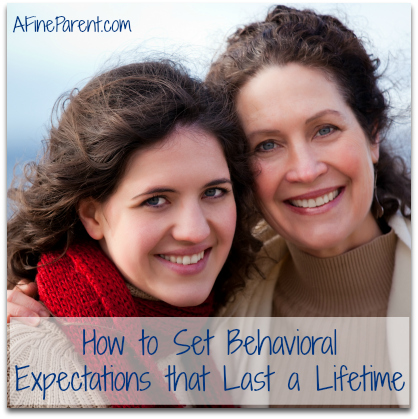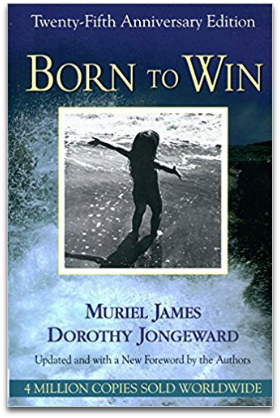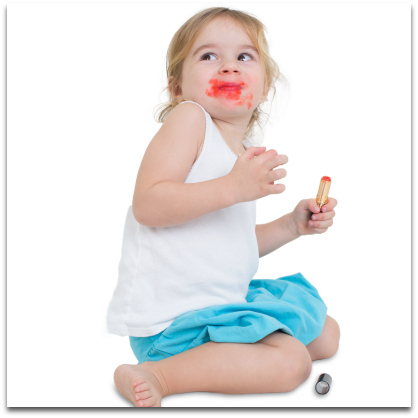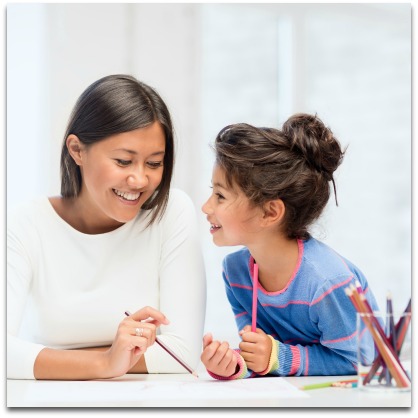 I am the child of a violent, alcoholic father and a narcissistic mother.
I am the child of a violent, alcoholic father and a narcissistic mother.
At 13, I was sexually molested by a man I worked for.
By 17, I was on a fast train to an early death, barreling downhill to that place with all the fire and brimstone.
Furthermore, I was convinced I NEVER wanted children because I believed I’d be the worst possible parent. I went through years of therapy but still never trusted myself to have children.
But at age 30—well, you know what they say—things happen. I was recently divorced, pregnant, and terrified.
My plan was to put my child up for adoption for her own well-being, but when she was born, all that changed.
I made a 13th-hour decision to raise my own child. God knew what she was doing—that decision turned out to be my saving grace.
I was challenged by the idea of setting behavioral parameters for my daughter. My mother gave me a few old books on child-rearing; they had little relating to the world in the 1990s. There were no parenting classes where we lived; I was on my own. Neither of my parents was a good role model to follow. I decided to approach the issue logically.
 I turned to the first book we used in therapy when I was 17, Born to Win by Muriel James, Ed.D., and Dorothy Jongeward, Ph.D. I’ve read this book at least 20 times over the years. I read it again when I brought my baby daughter home.
I turned to the first book we used in therapy when I was 17, Born to Win by Muriel James, Ed.D., and Dorothy Jongeward, Ph.D. I’ve read this book at least 20 times over the years. I read it again when I brought my baby daughter home.
Born to Win is based on transactional analysis theory. The concepts are fundamental to understanding how to grow a healthy, happy child: the need for positive stroking; listening instead of lecturing; speaking from the “Adult” and understanding the “Child” (both in myself and my daughter); the effects of parenting, childhood, and child ego states; and how we become autonomous adults. Exercises show how communication patterns can influence desired outcomes.
The Chapter One epigraph contains these words by Galileo:
You cannot teach a man anything,
You can only help him discover it within himself.
These words embody what it takes to raise a child. I can lead by example, I can hope to influence choices, I can provide opportunities, but I cannot “create” a person. She will be who she will be, in spite of me.
The question I had to answer was: what part will I play, and how? The very thought process scared me, raising my fear of failure.
I needed a plan, so I set to work.
 First, I identified my two most important factors: (1) the key characteristics of the kind of person I hoped she’d turn out to be, and (2) the kind of lifelong relationship I wanted to have with her.
First, I identified my two most important factors: (1) the key characteristics of the kind of person I hoped she’d turn out to be, and (2) the kind of lifelong relationship I wanted to have with her.
Then I identified the variables to address. Whatever guidance I established had to:
- Be simple.
- Be capable of evolving as she grew older.
- Be compatible with reasonable levels of expectation.
- Be sustainable.
- Apply to both of us, albeit with different levels of expectation and accountability.
That last part raised a few eyebrows, but my thought process stems from a belief that I should not expect others to do that which I am not willing to do myself. We needed to live by the same rules of the road.
I knew our life would have to be a team effort—there were only the two of us, and we were dirt poor when my daughter was young. Life was going to require effort from both of us; I couldn’t do everything alone. Any rules I set had to support her development as an effective team member and solid citizen.
I would have to lead by example. I did not want a “I am parent, you are child, and you will obey without question” life for either of us. I knew I wouldn’t be around all the time. I needed her to learn how to make appropriate life choices, understand that she’s accountable for the choices she makes, and know that her choices impact the lives of those around her.
I had friends who had a myriad of rules for their kids; some rules even seemed to conflict with each other. This was confusing to me, let alone a child.
I wanted no more than five key pieces of guidance that were broad enough to apply to a variety of situations.
I wanted rules for life—rules with levels of expectation that grew as my daughter grew and ways of holding her accountable that she could understand.
With these parameters in mind, I chose to trust myself, take the plunge, and create the basic rules that would guide our lives for years to come.
Rule #1: If it’s Not Yours, Don’t Touch it.
 This was the very first rule I taught my daughter. It covered pretty much everything—staying out of my jewelry, kitchen cabinets, the cat food and water, not taking someone else’s toy at daycare, not grabbing things in a store. This rule covered thousands of possibilities, growing in scope as she got older, including that stealing was intolerable.
This was the very first rule I taught my daughter. It covered pretty much everything—staying out of my jewelry, kitchen cabinets, the cat food and water, not taking someone else’s toy at daycare, not grabbing things in a store. This rule covered thousands of possibilities, growing in scope as she got older, including that stealing was intolerable.
The rule was effective and easy to implement. If I caught her getting into something that wasn’t hers, I’d ask her what rule #1 is. She’d recite it. Then I’d ask if the item was hers, she’d think a minute, then say “No.” I’d ask if she thought she was breaking the rule, and she’d say “Yes.” Then I’d ask what she needed to do now, and she’d say “Put it down” or “Put it back.” Once she executed that, I told her what a great kid she was. A few of those drills, and she understood the rule—for life.
I gave her the same respect about her belongings while still expecting her to take care of her things. I also made sure she knew what was “ours” that she could take or touch at will, an area that expanded in scope as she grew.
I knew she had this down when I heard her explain the rule to another child who’d taken one of her toys without asking!
Rule #2: Say “No” When You Want to, but Know Your Reason.
Wow, did I get an earful when I let people know about this one! Most people thought I had finally taken leave of my senses, especially teachers, caregivers, and my mother. I had to explain it to them.
As a survivor of child sexual abuse, I learned that a primary reason it happened was because I was never allowed to say “No” to any adult. I wanted to ensure my daughter was not only allowed to say “No” early in life but developed the courage to do so.
It wasn’t enough to just say “No.” I also made sure she was always required to provide a reason why. She had to think through the situation and articulate her reasoning.
We’d discuss the pros and cons, the ramifications of her choice. Sometimes she’d change her mind, but if her reasoning was valid and her choice was still “No,” and if there was no safety risk involved, I let her go with her choice. This also allowed her to learn that there were sometimes unexpected consequences to choices.
As she grew older, this concept not only helped keep her safe but was key to her developing a sense of justice and an ability to fearlessly stand up for what she believes is right while learning to articulate why.
Rule #3: Always Accept Responsibility for Your Actions.
This involves the ramifications of choices and the impact she had on others. I wanted her to hold herself accountable and understand that others would hold her accountable as well. This is key to raising a global citizen.
If she did something wrong, I expected her to have the courage to own up to it.
Taking responsibility requires thinking through a situation before choosing a course of action because you’re going to have to live with it. I wanted her to grasp the concept of being able to face herself in the mirror every day. I needed her to learn that she might be responsible for the well-being of others.
Rule #4: Do the Right Thing Even When It’s Hard or Scary, and Know I’ve Always Got Your Back.
 This rule involves telling the truth; standing up for what’s right, not abandoning someone who’s counting on you; and making the right choice, even if it makes things harder for you or the consequences scare you.
This rule involves telling the truth; standing up for what’s right, not abandoning someone who’s counting on you; and making the right choice, even if it makes things harder for you or the consequences scare you.
This meant picking up after herself, even if she didn’t feel like it, or sharing what she had with another. By young adulthood, it meant taking charge to do what was necessary to keep the household unit functioning, giving up something to help someone in need, or speaking up when witnessing an injustice. I made sure she knew that if she ever got in trouble for standing her ground, I’d back her up. She learned she could trust what I say.
By the time she was a teenager, “doing the right thing” included calling Mom, at any time of day or night, if she ever found herself in a dicey situation or if she’d been drinking. I made sure she knew I was her safe ride home—and for her friends too, if need be—no questions asked. No matter how embarrassed she might be, she knew I only cared that she arrived home alive and uninjured.
Rule #5: Communicate Effectively.
This rule was almost self-preservation. I was blessed with a quiet baby who slept through the nights and rarely cried. Then … the day she learned to talk. Oh my. Since that day, if she’s awake, she’s talking.
I needed her to articulate reasoning as well as learn to manage conflict. I taught her how to talk in “I language” so she learned to take ownership of her thoughts and feelings. I taught her active listening skills, how to provide feedback, and how to seek clarification. I encouraged her to communicate her thoughts and to engage in meaningful discussion.
My goal was an ability to discuss situations that arose and jointly develop a plan to deal with it. This gave her a sense of belonging to the team, and being part of the solution ensured she’d fulfill her part. In a nutshell, it’s a strategy that curtails arguments.
 As she grew, her communication skills improved. The ability to sensibly discuss difficult issues today helps her manage relationships as well as support her decision-making processes.
As she grew, her communication skills improved. The ability to sensibly discuss difficult issues today helps her manage relationships as well as support her decision-making processes.
These five rules formed the basis for the development of personal integrity and a lifelong sense of responsibility for self and others. I never let her slide, and I lived by the same rules I set down for her. If I wasn’t behaving in accordance with the rules, I expected her to call me out on it—something she still does today.
We survived the hardest of times because we were a team. Certainly, there were rough patches. Raising kids is not an exact science, but overarching our lives is mutual respect, love, and a positive relationship that few people are lucky enough to achieve. I wasn’t a magical wizard; I just worked hard to live up to my expectations for us both.
I must have done something right because when she was nine, she saved me from making a terrible mistake. Like I said, we were a team. We were all each other really had, we relied on each other. When I completed graduate school, I was selected for a position as a Presidential Management Intern with the U.S. Department of the Army, Headquarters. Sight unseen, I had to uproot us from our home in New Mexico and move to Washington, D.C.
My truck loaded down, looking like the Clampetts Go to Maui, fear got the better of me going through Tennessee. I pulled off at an exit in the middle of nowhere. I was crying my heart out, crying what a fool I was to leave home with no idea what I was getting us into. Barely able to talk, snot running down my face, I was in emotional meltdown.
I was about to turn the truck around and head home when my daughter reached out, touched my shoulder, and said “Mom, it’s okay. You need to keep going. This is a great opportunity for us, a road to no longer being poor. If we get there and, after we give it a chance, we hate it and want to go home, we can pack up the truck and go home. We’ll make it; it’ll be hard. I miss home too, but we’ll be okay. We can always go back, but you owe it to yourself to go forward and at least give it a chance. I trust you. You worked too hard, and we’ve come too far together to turn back now.”
I was stunned into silence. Everything I’d hoped to teach her was packed into that moment. I looked at her and saw trust and faith in her eyes—no fear. She’d risen to the challenge in a time of crisis and clearly articulated a sensible argument without fear of being discounted. She’d acted as a team member because it was the right thing to do. I had no choice; she was right—I owed it to us both to continue forward.
That memory still pops up now and again for both of us. My daughter, now 28 years old, is all I dreamed she would be and more. This outcome is not from anything I specifically taught her, but rather because I set guidance that gave her the opportunity to experience life safely and learn from her experiences. For as wise as she was at nine, I know she’ll be an amazing parent herself one day.
The 2-Minute Action Plan for Fine Parents
- Think about communication with your children. Are they encouraged to articulate their needs, fears, and desires in a positive way? Do you engage in active listening and encourage it in your children? Do your children feel secure raising concerns and know you’ll actually hear them?
- The world is a scary place for kids and parents. Do your children know how to say “No” effectively? Are they comfortable articulating why they say “No” to something? Are they secure in calling you for help when they find themselves in a dangerous situation?
- We all get busy and tend to sometimes rush through our communications. Engage in active listening when your child speaks to you. Just knowing they can trust you to really hear them tells them they are important to you.
The Ongoing Action Plan for Fine Parents
- Take a week to make a list of the “rules” in your household. How many can you identify? This may take a few days because we can be unaware of rules we’ve set! Do you have unwritten or unspoken rules you assume your children understand? Write them down as you come across them. At the end of the week, review them. How many do you have? Are they sustainable; can they grow as your children grow? Go over your list, looking for commonalities. Are there rules sharing common themes you can group together? In the future, if you run across a “rule” you realize you’ve missed, add it to the list and see where it fits in.
- Go back to your final list of “rules.” What level of expectation do you set for your children in association with each one? Are your expectations realistic? Are they high enough to encourage ambition but achievable at their given age levels? Think about how you explain your expectations to your children. Can they articulate to you what you expect of them—i.e., can they show they understand you?

Thank you for sharing your experience & journey. I can completely relate to the strength your 9 year old daughter gave you to keep going (in the right direction). My 9 year old has shown emotional understanding beyond her years & has encouraged me at times I’ve wanted to give up. These wise little souls are beautiful beings.
I would love to read your memoirs one day
Really enjoyed this and I’ll have to check out your memoire now. As someone with childhood issues as well, now raising my 2 year old daughter on my own at age 44, this article really speaks to me. Great advice!
Thank you for your kind words. I can’t swear what I did works for everybody, but it worked for us. I’m still working on the memoir – I came out of retirement to return to work in my field, which eats most of my time, but if you are interested when I finally finish it I’d be happy to send a free copy if you share your e-mail address with me. I’ll put it on my list of people who’ve been asking for a copy.
Loved your article, thank you. Can you please let me know when your book is published? jettmannix@gmail.com
An Aussie fan
I’m glad you liked it and yes, I’d be glad to let you know when I finish my memoirs. Unfortunately, it’s a long time coming – but I’m building an email list, and eventually I hope to launch an author platform page and my plan is to send free copies to this first group of people who’ve shown an interest. Hopefully I can meet people’s expectations!
Such a great story and thank you for sharing it so graciously. The thing that stands out for me, is that raising our adult child is a journey. My only reservation relates to the parents who are expecting their child of under age 8 to be able to sustainably perform like this future adult. It’s appreciating that we can teach them skills, and as is mentioned, have age appropriate expectations of their ability to follow through.
For some of us, we may never get that warm fluffy parenting moment while they live at home. We have to trust that they are learning from what we are teaching, even if we don’t get the benefit.
As the parent of four now adults, my bookends are kids that didn’t master their emotional management and decision making until their full adult brain arrives. That didn’t mean they weren’t learning, it’s that their ability to sustainably implement was still developing.
It’s important to remember that all communication is feedback. Our children are figuring their way through. While it is lovely that this child to that moment to encourage her mother to keep going. That isn’t the role of a child. It does demonstrate the partnership that can happen, especially in single parent families, though is not appropriate to expect that from every child. There was an emotional maturity way beyond her years. Not reasonable to expect that from every child.
We can encourage our child to be thoughtful. We can encourage them to think critically. We can enable them to be emotionally flexible, to have emotional intelligence. Though to remember, acknowledge and appreciate, that they are on their own journey towards emotional mastery, and that there will be times where we disagree with their choices. How we manage those situations, to be respectful to them around their choices is a reflection of our own emotional maturity.
What I know is, that even though my wild child was a constant worry, and regularly in conflict, that by providing him the structure to learn to make great choices, when he had the maturity to do that, the skills were all there.
It’s appreciating that it’s not our child’s responsibility to reciprocate. It’s ours to create an environment that they want to. Subtle and significant difference in the perspective of how to approach the journey.
Again your story is appreciated. Showing that we are not defined by our past, unless we choose. When we choose to do differently, we get a different outcome.
Thank you.
Thank you for your comment! Yes, it’s always a journey. We had lots of boulder scrambles and dodged a lot of debris over the years, but now she’s grown up to be a wonderful woman. As tough as life was, I’d do it over again in a heartbeat without changing a thing. Looking back now, it’s not so much how she turned out as it is how much she made me the person I am today, and that, I think, is the true gift we get from our children.
Wow…This is truly amazing. These are really the main things that we beleive in here at home in Kenya, but I have never thought to write them down or explain them to the kids, for use in various situations.
I hope its OK for me to borrow and use at my home.
Thanks,
Evah.
Thank you for your comment. I think I should like living in Kenya! When my daughter was growing up, I was winging it every inch of the way. There were many, many times I was terrified I was screwing her up. Now she is 30, and she’s exceeded all my expectations – maybe more than I bargained for because now she pushes me and sets expectations for me. Feel free of course to use whatever you take of value from my story – I’m glad to be of service.
GOD BLESS YOU
in your BeaUtiFULLL endeavouring as a parent and partner-in- life to your preciously loved daughter!
Your courage to persevere and tender tenacity to learn and to grow as an effective parent and evolving spirit on the planet will be deeply rewarded!!!
And the joy that you feel and have been so INspired to share with your daughter and others will be ever reciprocated in a myriad of forms over your Loving Life!
You have spoken deeply to my passionate desiring to be the most positive and INspiring of parents myself and I pray for your joyous and peaceful journey in thIS Precious process!
Thank you for sharing …
LOVELY LIFE-GIVING YOU !!!
Thank you for your kind words. It has been, and it still is, a glorious journey. May yours always be just as glorious!
You deserve so much appreciation. So inspiring is your motherhood journey and almost in tears seeing the maturity of a little girl during tough time.
I’m also a single mom and in the beginning I too had similar feeling for being traumatised, devastated “I’m not fit for parenting” but together we crossed number of hardships and now consider myself fortunate and confident too for being her mom. Thank you for sharing and letting me believe “I can and I shall”
It’s good to know there are others out there with shared experiences, and it’s important to use our experiences to give encouragement to others. I’m glad you enjoyed the article. Thank you!
What a beautiful and inspiring article! Thanks for sharing your story.
I’m glad you found it useful! Thank you!
This is really very inspiring and instructive. It simply shows that raising responsible children in this age is possible when we have the right tools. Thank you so much for sharing.
Glad you enjoyed the article. The great thing about AFP blog is that it provides a concentrated source of experiences that others can benefit from. Raising kids really does take a village. Thanks for your comment.
I absolutely loved rule number 2! As someone who has been sexually molested as a child and raped as an adult I’ve always trying to think of ways to teach my son that saying no to adults is ok sometimes depending on the situation and this rule is just perfect! Thank you so much for sharing!
Sara
Glad to help. I think people with traumatic pasts are best situated to teach others how to be safe in a dangerous world, without being afraid of living.
Your story touched me and gave me hope for the future. Thank you for sharing your journey and your wisdom.
I’m thankful for the opportunity to help others, and hope to continue doing so in the future. Thank you!
Thank you for sharing.
You are very welcome.
Wow. This shows that with God, anything is possible. How can someone with such a rough childhood rise up so effectively to the challenge of parenting. Her nine year old daughter’s reaction to her meldown left me speechless. God bless you as you continue to inspire parents with your example.
I’m glad you enjoyed the article! I’m in the process of writing my memoirs, and in doing so I realize just how much fun I had raising my daughter! Every day I’m thankful I didn’t pass up that opportunity. I’m hoping my memoirs will provide hope, encouragement, and strategies to others with situations and concerns similar to what I had to deal with; your comment reassures me that I need to finish that task. Thank you!